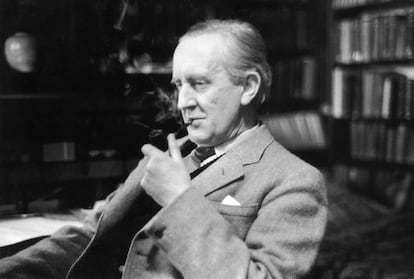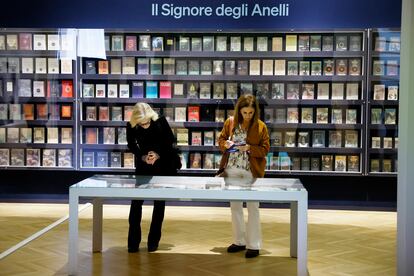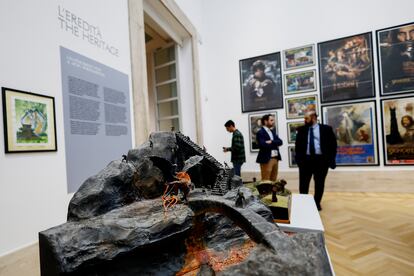Meloni gifts herself an exhibition on Tolkien, a reference point for the Italian radical right
The Italian prime minister often quotes the British author, creator of ‘The Lord of the Rings,’ whose works marked the youth movement of the neo-fascist MSI

The first chords began, the audience broke into applause under the Roman sky, emotion at its peak. A voice-over announced: “The day of defeat will come, but it will not be this day.” Then Giorgia Meloni appeared. The final campaign rally of the right-wing coalition was held in the Piazza del Popolo in Rome. But the phrase with which the leader of the Brothers of Italy took the stage belonged to a pre-battle from Aragorn, one of the main characters in The Lord of the Rings, the masterpiece written by J. R. R. Tolkien, the favorite author of Meloni and of a whole generation of youth members of the Italian Social Movement (MSI), who found in the story a wonderful metaphor for many of the political ideals then promoted by the neo-fascist party. A year later, Rome is dedicating a major exhibition to Tolkien, entitled Tolkien: Man, Teacher, Author, to commemorate the 50th anniversary of his death.
The idea of the exhibition, which constitutes a complete journey through the life and work of the author, came from the Minister of Culture, Gennaro Sangiuliano. The event, in a way, was also connected to the project of giving back a cultural centrality, some form of roots, to the new Italian radical right. The idea is based in the belief that the left has imposed its political narrative in recent years through culture, with a certain hegemony of cultural figures. To counter this — and Sangiuliano is one of the main proponents of this theory — it has been insisted that the right must find its own references, elevate them, and devote to them the same care that its opponents have for years. Even resorting to revisionism and, if necessary, to the myths of his political adversaries such as Pier Paolo Pasolini or Antonio Gramsci.
Tolkien, however, has a less far-fetched hook. The universe of the British author — expressed in the exhibition through videos, books, costumes from Peter Jackson’s homonymous film saga or rejection letters for the first editions of his work — was for many years a national obsession for the MSI youth, who even organized a kind of Hobbit camp (the first was held in 1977). This was not an isolated event. A year earlier, the MSI founded the Fellowship of the Ring, a musical group that took its name from the first part of the saga. The radical right saw in the idea of community, environment, conservatism, traditions, certain religious values, rural pride, or the fight against a hidden power, a reflection of its own mission.

Meloni has admitted that some of her friends were given nicknames like Frodo or Gandalf and for years she has quoted fragments of Tolkien’s work at her rallies, or in her autobiography. And if she were given the choice of characters, she has confessed on more than one occasion, she would be Sam Gamgee. Why? “Well, he has a particularity,” explains the curator of the exhibition, Oronzo Cilli. “Knowing what his mission is: to help the chosen one, who is Frodo. And to get his friend to fulfill that mission. He is a very humble character, coming from a very humble family, although he later becomes mayor.”
Meloni’s sister, however, assumed the role of Sam after her sibling’s rise to power in the Italian elections just over a year ago, in a show of unconditional support. “I will accompany you to Mount Doom to destroy that ring, as Sam did with Frodo, knowing that it will not be my story that will be told, but yours, as it is right that it should be.” The ring, both in the book and in the ideology of the right, signifies power that corrupts and brutalizes the spirit of community and freedom. Something like the establishment, the world of finance, and the so-called bureaucracy by which a certain political class betrayed the people.
The exhibition has sparked some controversy in Italy, where many consider it excessive to dedicate the National Gallery of Modern Art and a €250,000 budget to the prime minister’s favorite author. Cilli, however, who has done a didactic job, dissociates it from any link to politics. “I was asked to curate this exhibition in a philological way, respecting the memory and the work of this writer. To talk about nothing else but the man, his work, and his greatness. Look, Tolkien’s work has nothing to do with [politics]. In 1976 and 1977, when he became an author embraced by a political minority of the right, he also became a reference for a part of the left. In Italy, but also among the hippies in the U.S. Everyone found something in him. And when he died, some in England called him a Marxist and others a fascist.”

Beyond interpretations, there is no doubting Tolkien’s conservative character and the deep Catholicism that breathes through his work and his own biography, as the exhibition displays. For many of Meloni’s co-religionists, Tolkien remains an intellectual reference that functions as a banner of the struggle to defend the Christian world and Western identity against globalization, multiculturalism, relativism, and a certain progress linked to social-democratic ideals. The Minister of Culture himself, who announced the exhibition last July during the meeting of the Brothers of Italy youth, calling it “a gift,” has defended that idea. “Tolkien, let me say it, not I but many critics say it, was a true and sincere conservative, a sharp conservative with a great critical spirit. Tolkien was a fervent anti-fascist and a fervent anti-communist.”
Sangiuliano, however, also confessed that there are “aspects” in Tolkien’s literature that “particularly” please Meloni’s government, such as “the value of community, of friendship, of the values of solidarity and of what is human.”
“I often speak of the ongoing clash in a globalized society between those who, like me and us, defend a conception of the citizen with rights and duties and those who want to degrade the individual to mere bar codes and consumers, passive with respect to the world,” he said. An idea that in Europe partners such as the Spanish far-right party Vox shares, and which, on occasion, has also turned to the British writer.

The minister, a former card-holder of the MSI, defined Tolkien as “a liberal in the true sense of the word” and criticized those who have branded as “fascist” other exhibitions staged by the government, advancing his intention to organize another on the thinker and founder of the Italian Communist Party, Antonio Gramsci, a figure who is also part of the offensive of the radical right in Europe to provide itself with cultural arguments for ideological warfare.
The origin of this current, in fact, was born in France and headed by the founder of the New Right, Alain de Benoist. De Benoist is one of the great theoreticians of this right-wing reading of the philosopher Gramsci, especially interested in the concept of hegemony applied to the idea of cultural power. It is the basis on which the European radical right is trying to build its new narrative and which has been used by leaders such as Viktor Orbán in Hungary, who wrote his university thesis on the Italian thinker.
Sign up for our weekly newsletter to get more English-language news coverage from EL PAÍS USA Edition
Tu suscripción se está usando en otro dispositivo
¿Quieres añadir otro usuario a tu suscripción?
Si continúas leyendo en este dispositivo, no se podrá leer en el otro.
FlechaTu suscripción se está usando en otro dispositivo y solo puedes acceder a EL PAÍS desde un dispositivo a la vez.
Si quieres compartir tu cuenta, cambia tu suscripción a la modalidad Premium, así podrás añadir otro usuario. Cada uno accederá con su propia cuenta de email, lo que os permitirá personalizar vuestra experiencia en EL PAÍS.
¿Tienes una suscripción de empresa? Accede aquí para contratar más cuentas.
En el caso de no saber quién está usando tu cuenta, te recomendamos cambiar tu contraseña aquí.
Si decides continuar compartiendo tu cuenta, este mensaje se mostrará en tu dispositivo y en el de la otra persona que está usando tu cuenta de forma indefinida, afectando a tu experiencia de lectura. Puedes consultar aquí los términos y condiciones de la suscripción digital.









































